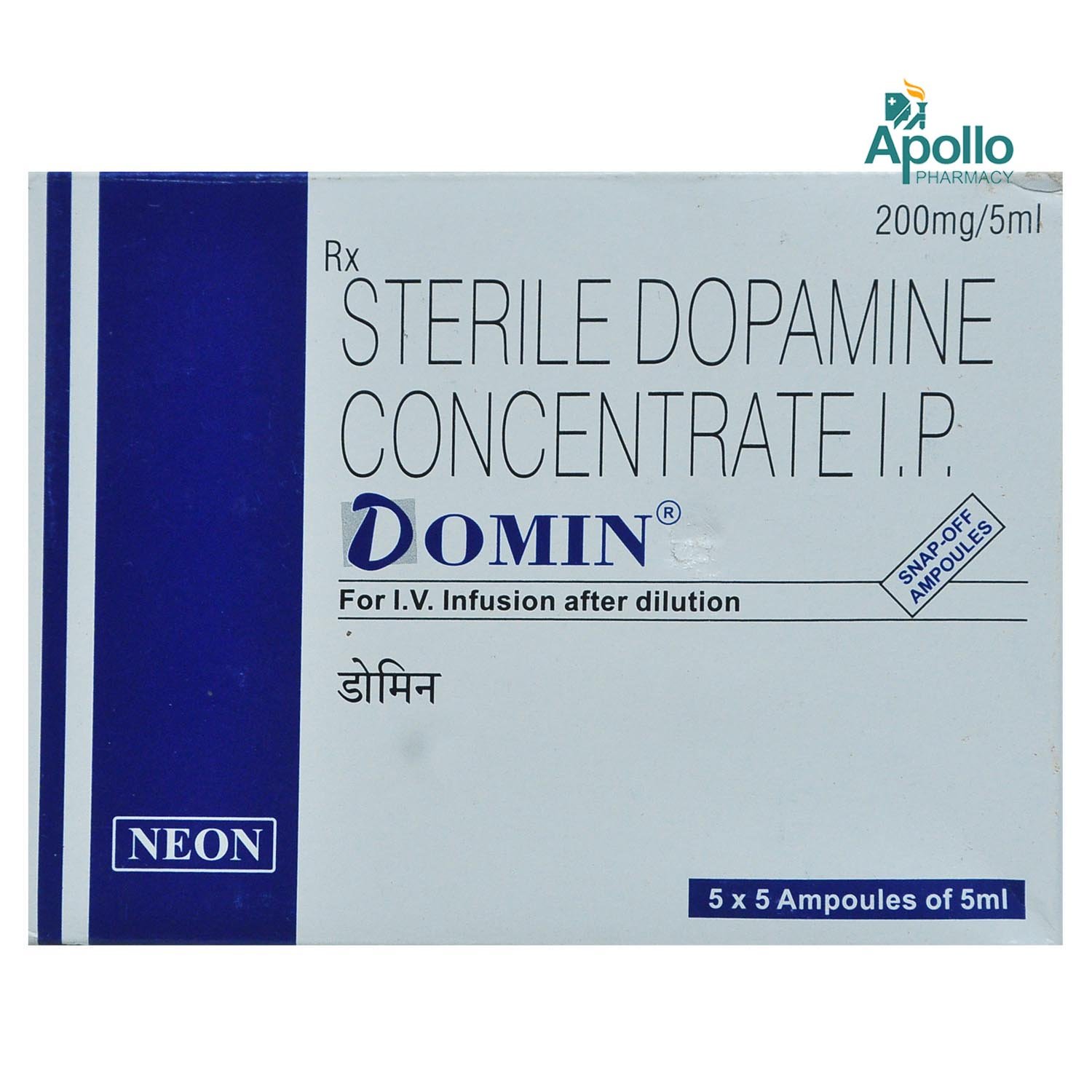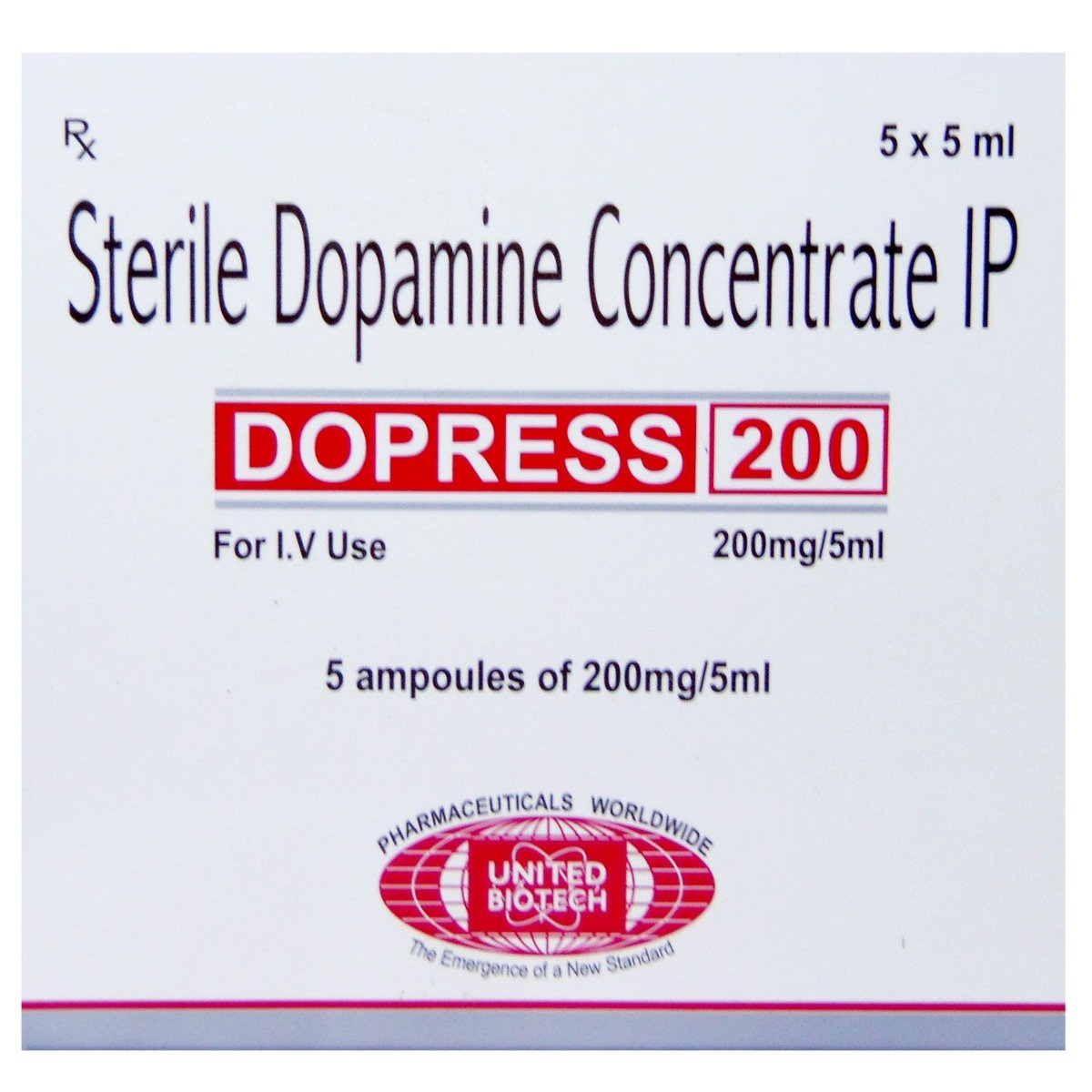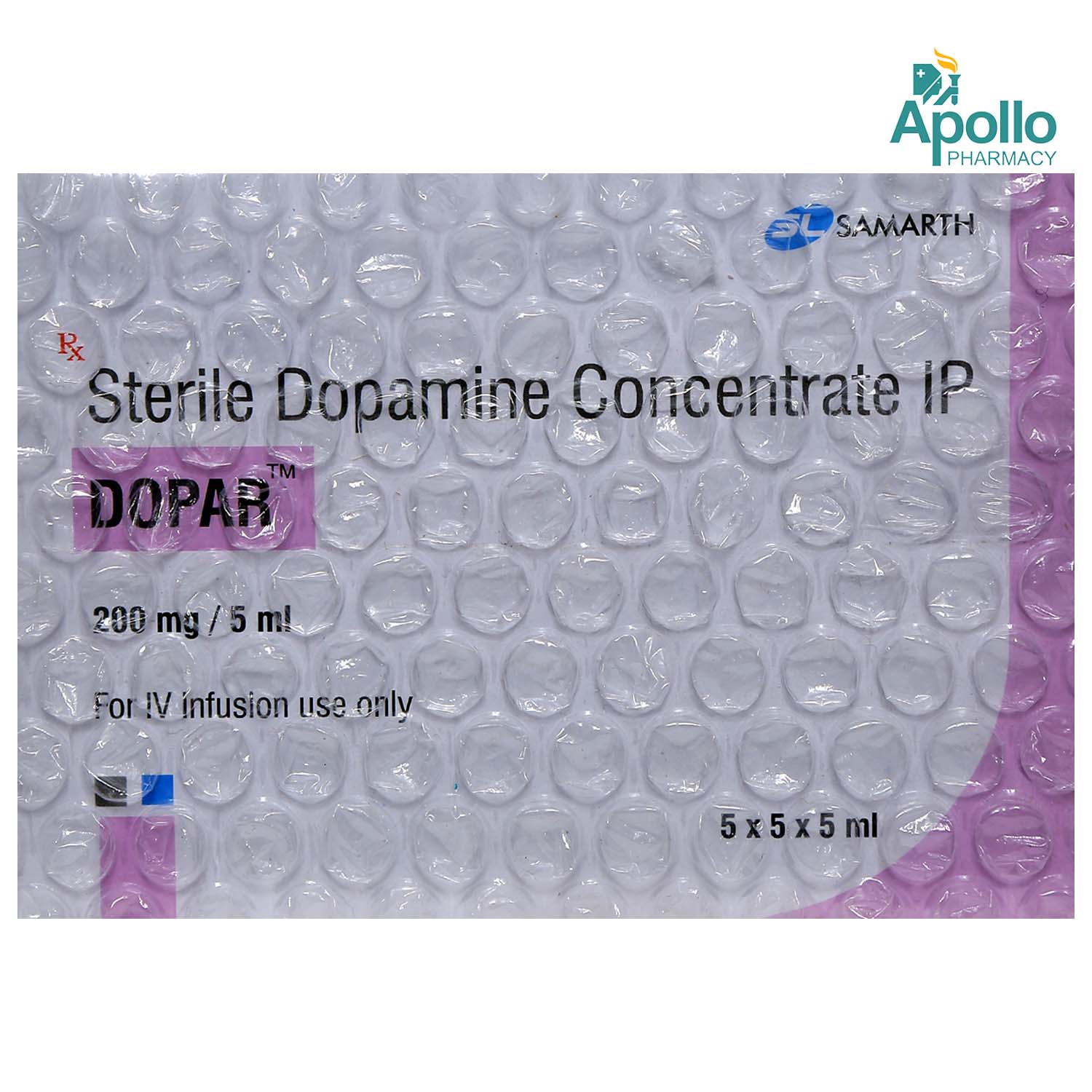Dopamine
About Dopamine
Dopamine belongs to a class of medicines called vasopressors used to treat low blood pressure or shock after a heart attack, trauma (injury), blood poisoning or kidney failure. Also, it may be used in people with congestive heart failure (heart failure due to build-up of blood or fluid) to help the heart pump better. Hypotension (low blood pressure) is a condition in which the blood flows through the blood vessels at lower than normal pressures.
Dopamine contains Dopamine that works by increasing blood flow to the muscles and increasing the pumping efficiency of the heart. Also, it increases blood flow to the kidneys.
Dopamine will be administered by a healthcare professional; do not self-administer. Sometimes, Dopamine may cause common side effects such as headache, nausea, shortness of breath, chest pain or irregular heartbeat. Most of these side effects of Dopamine do not require medical attention and gradually resolve over time. However, if the side effects persist, please consult your doctor.
If you are allergic to Dopamine or other any other ingredients of Dopamine, please tell your doctor. Dopamine is not recommended for children as safety and effectiveness were not established. If you are pregnant or breastfeeding, please inform your doctor before receiving Dopamine. If you have a history of blood circulation problems, inform your doctor, as you will be monitored for any changes in the colour or temperature of your fingers or toes.
Uses of Dopamine
Medicinal Benefits
Dopamine contains Dopamine used to treat low blood pressure or shock after a heart attack, trauma (injury), blood poisoning or kidney failure. It works by increasing blood flow to the muscles and kidneys. Additionally, it may be used in people with congestive heart failure (heart failure due to the build-up of blood or fluid) to help the heart pump better by increasing the pumping efficiency of the heart. Dopamine may also be used in combination with other medicines to treat low blood pressure that occurs after open heart surgery.
Directions for Use
Storage
Side Effects of Dopamine
- Headache
- Nausea
- Shortness of breath
- Chest pain
- Irregular heartbeat
Drug Warnings
If you are allergic to Dopamine or other any other ingredients of Dopamine, please tell your doctor. Dopamine is not recommended for children as safety and effectiveness were not established. If you are pregnant or breastfeeding, please inform your doctor before receiving Dopamine. If you have a history of blood circulation problems, inform your doctor, as you will be monitored for any changes in the colour or temperature of your fingers or toes. If you have recently taken monoamine oxidase (MAO) inhibitor medicines (used for depression), inform your doctor, as the dose of Dopamine may be reduced in such cases. If you experience any pain or swelling at the injection site during or immediately after the injection, inform your doctor immediately so that appropriate treatment may be given.
Drug Interactions
Drug-Drug Interactions: Dopamine should not be given along with anaesthetics (cyclopropane, halogenated hydrocarbon anaesthetics). If you are taking beta-blocker (propranolol), anticonvulsant (phenytoin), antidepressants (phenelzine, selegiline, rasagiline, entacapone, moclobemide), inform your doctor before receiving Dopamine.
Drug-Food Interactions: No interactions found.
Drug-Disease Interactions: Avoid receiving Dopamine if you have hyperthyroidism (overactive thyroid gland), irregular or rapid heartbeats or a tumour that causes an increase in blood pressure. If you have a history of blood circulation problems or have diabetes, high blood pressure, Raynaud’s disease (fingers become white and very painful when cold), or liver or kidney problems, inform your doctor before receiving Dopamine.
Drug-Drug Interactions Checker List:
Safety Advice

Alcohol
cautionAvoid consumption of alcohol. Please discuss with your doctor if you have concerns.

Pregnancy
consult your doctorLimited data is available on the effect of Dopamine in pregnancy. Hence, if you are pregnant or planning for pregnancy, inform your doctor before receiving Dopamine.

Breast Feeding
consult your doctorLimited data is available on the effect of Dopamine on breastfeeding. Hence, if you are a nursing mother, inform your doctor before receiving Dopamine.

Driving
not applicableDopamine is generally intended for use in hospitalized patients.

Liver
consult your doctorIf you have liver problems, inform your doctor before receiving Dopamine. Your doctor may adjust the dose of this medicine or prescribe a suitable alternative based on your condition.

Kidney
consult your doctorIf you have kidney problems, inform your doctor before receiving Dopamine. Your doctor may adjust the dose of this medicine or prescribe a suitable alternative based on your condition.

Children
unsafeDopamine is not recommended for children as the safety and effectiveness were not established in children.
Habit Forming
Diet & Lifestyle Advise
- Eat small meals more frequently.
- Drink plenty of fluids to stay hydrated as dehydration may reduce blood volume resulting in low blood pressure.
- Include vitamin B12-rich foods such as animal meats, eggs, fortified cereals, and nutritional yeast.
- Eat foods rich in folates such as beans, asparagus, lentils, leafy greens, citrus fruits, liver, and eggs.
- Try to eat smoked fish, canned soup, pickled items, cottage cheese, and olives, as salty foods can also increase blood pressure.
- Take frequent breaks if you exercise outdoors in extreme heat.
- Avoid spending a long time in hot tubs, steam rooms, and saunas to prevent dehydration.
Patients Concern
Disease/Condition Glossary
Blood pressure is the measurement of the heart's force to pump blood to all parts of the body. Hypotension (low blood pressure) is a condition in which the blood flows through the blood vessels at lower than normal pressures. Low blood pressure symptoms include dizziness, tiredness, lightheadedness, loss of consciousness, nausea, depression, blurry vision, or clammy (wet or sweaty) skin. Systolic pressure is the pressure when the heart pumps blood out. On the other hand, diastolic pressure is the pressure when your heart is at the resting stage between heartbeats. If your blood pressure is 90/60 mm of Hg, it means the systolic pressure is 90 mm of Hg, and diastolic pressure is 60 mm of Hg. Normal blood pressure lies between 90/60 mm of Hg and 120/80 mm of Hg. If the blood pressure is 90/60 mmHg or lower, it is considered low blood pressure.
FAQs
Dopamine contains Dopamine that works by increasing blood flow to the muscles and increasing the pumping efficiency of the heart. Also, it increases blood flow to the kidneys.
Dopamine should be used with caution in diabetic patients. Therefore, if you have diabetes, inform your doctor before receiving Dopamine.
Dopamine may cause a headache as a common and temporary side effect. However, if the condition persists or worsens, please inform your doctor.






